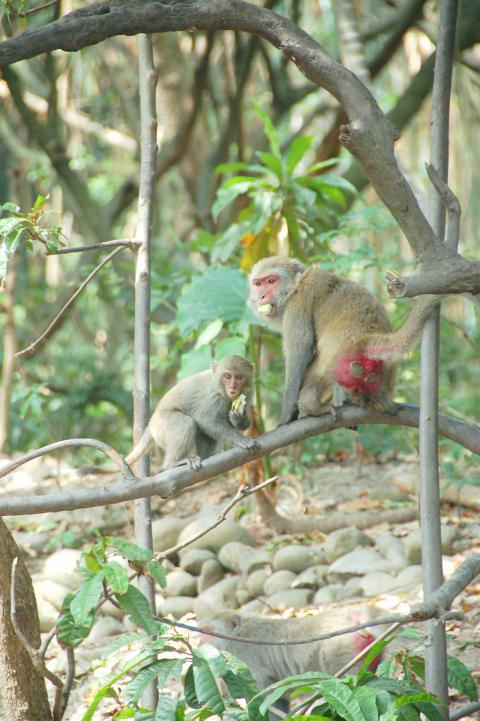Yunlin County has recruited and trained seven people to chase monkeys away from farms in the county, which has a large population of Formosan macaques.
The seven, selected from more than 30 applicants, are to soon begin work in the mountains of Gukeng Township (古坑). Their primary tactic is to employ firecrackers to deter the primates.
It is better to use firecrackers to scare off the animals than to erect electrified fencing or adopt sterilization to reduce their numbers, the township administration said.

Photo: Huang Shu-li, Taipei Times
The administration said the job of “monkey-chaser” is more difficult than it may seem and that most recruits are older farmers, although it also received applications from young people with college degrees.
The chasers are to start work on Monday at a salary of NT$24,000 per month.
The Formosan macaque, also known as the Formosan rock monkey, is native to Taiwan.
It once faced extinction due to human hunting before being listed as “precious and rare” and placed under strict protection, in accordance with the 1989 Wildlife Conservation Act (野生動物保育法).
By 2009, the Formosan macaque population had surged to 250,000, leading the Council of Agriculture to downgrade the species’ status to “conserved.”

The manufacture of the remaining 28 M1A2T Abrams tanks Taiwan purchased from the US has recently been completed, and they are expected to be delivered within the next one to two months, a source said yesterday. The Ministry of National Defense is arranging cargo ships to transport the tanks to Taiwan as soon as possible, said the source, who is familiar with the matter. The estimated arrival time ranges from late this month to early next month, the source said. The 28 Abrams tanks make up the third and final batch of a total of 108 tanks, valued at about NT$40.5 billion

Two Taiwanese prosecutors were questioned by Chinese security personnel at their hotel during a trip to China’s Henan Province this month, the Mainland Affairs Council (MAC) said yesterday. The officers had personal information on the prosecutors, including “when they were assigned to their posts, their work locations and job titles,” MAC Deputy Minister and spokesman Liang Wen-chieh (梁文傑) said. On top of asking about their agencies and positions, the officers also questioned the prosecutors about the Cross-Strait Joint Crime-Fighting and Judicial Mutual Assistance Agreement, a pact that serves as the framework for Taiwan-China cooperation on combating crime and providing judicial assistance, Liang

A group from the Taiwanese Designers in Australia association yesterday represented Taiwan at the Midsumma Pride March in Melbourne. The march, held in the St. Kilda suburb, is the city’s largest LGBTQIA+ parade and the flagship event of the annual Midsumma Festival. It attracted more than 45,000 spectators who supported the 400 groups and 10,000 marchers that participated this year, the association said. Taiwanese Designers said they organized a team to march for Taiwan this year, joining politicians, government agencies, professionals and community organizations in showing support for LGBTQIA+ people and diverse communities. As the first country in Asia to legalize same-sex

MOTIVES QUESTIONED The PLA considers Xi’s policies toward Taiwan to be driven by personal considerations rather than military assessment, the Epoch Times reports Chinese President Xi Jinping’s (習近平) latest purge of the Chinese People’s Liberation Army (PLA) leadership might have been prompted by the military’s opposition to plans of invading Taiwan, the Epoch Times said. The Chinese military opposes waging war against Taiwan by a large consensus, putting it at odds with Xi’s vision, the Falun Gong-affiliated daily said in a report on Thursday, citing anonymous sources with insight into the PLA’s inner workings. The opposition is not the opinion of a few generals, but a widely shared view among the PLA cadre, the Epoch Times cited them as saying. “Chinese forces know full well that